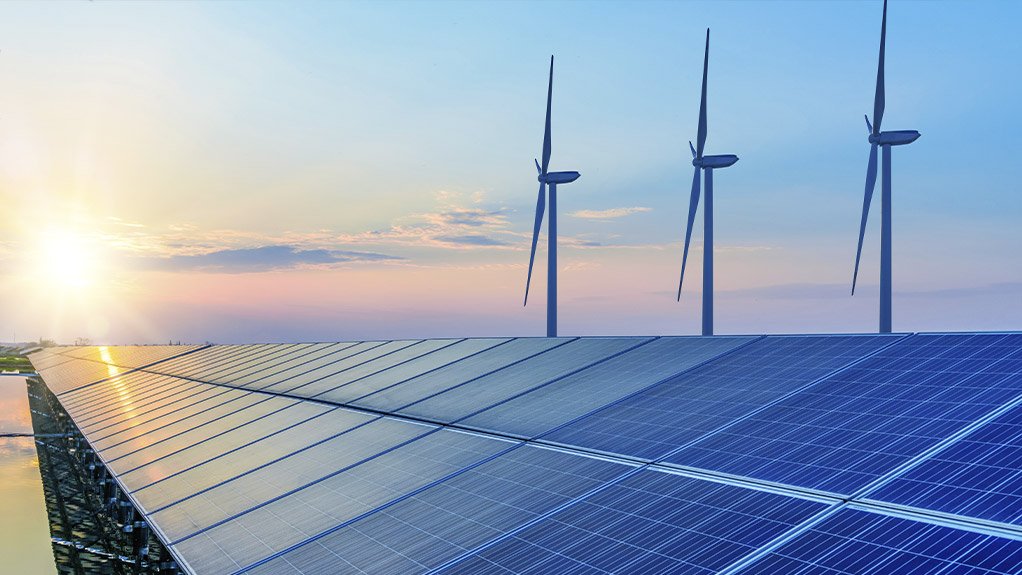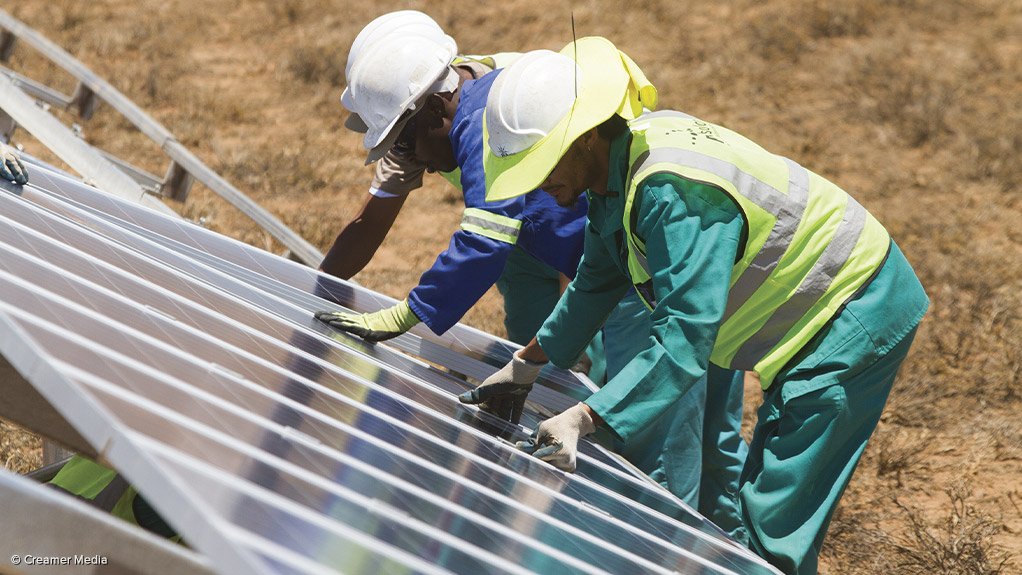Success of renewables programme continues



WINDOW OF OPPORTUNITY 27 preferred bidders signed agreements last year and their respective renewable energy projects are well underway
INSTALLING JOBS Many job opportunities have been created as a result of the Renewable Energy Independent Power Producer Procurement Programme
Photo by Creamer Media
Over the past eight years, the Renewable Energy Independent Power Producer Procurement Programme (REIPPPP) has attracted about R209.4-billion in committed private-sector investment, with the successful fourth window bids being valued at about R56-billion.
South African companies, such as financial institution Old Mutual, diversified investor and services provider Phakwe, energy developers Red Cap and Pele Green, among others, account for the majority of private investors in the REIPPPP.
State-owned entities Central Energy Fund and Public Investment Corporation have also invested significantly in the programme.
For the fourth window of the programme, 27 projects were identified as preferred bids in 2015. However, the procurement process was stalled after State-owned power utility Eskom announced in early 2016 that it would no longer conclude power purchase agreements with independent power producers, owing to a generation surplus.
This changed in April 2018, when the 27 preferred REIPPPP project agreements were finally signed. The preferred bidders include 12 solar photovoltaic projects, 12 wind farm projects, a concentrated solar power project, a mini-hydro project and a biomass project.
Construction is now well under way on a number of the projects, with some nearing completion.
The 27 projects are expected to create about 58 000 new jobs, mostly during construction and mostly in the rural areas of the Northern, Eastern and Western Cape, North West, Free State and Mpumalanga. There is also potential to create a further 1 500 jobs in the manufacturing sector as a direct spin-off from the projects.
In February, former Energy Minister Jeff Radebe said at a media briefing, in Pretoria, that renewable-energy independent power producers (REIPPs) had created 38 701 job-years for youth and women from surrounding communities.
He added that local communities had benefited from the more than R1-billion spent by REIPPs on education by upskilling teachers, providing extra teachers and classrooms, as well as by awarding more than 600 bursaries to students from disadvantaged communities.
In the health sector, the REIPPPP has resulted in the provision of health facilities, with further contributions to social development through feeding schemes, as well as the support of old-age homes and early childhood development.
The REIPPPP has also helped to establish more than 1 000 small enterprises.
Meanwhile, black South African equity shareholding in the REIPPPP has progressively increased with each bidding round.
Radebe said the South African equity shareholding, from the first to the fourth bidding window – including the first and second small-project bidding windows – equates to about 52%, or R31.4-billion, of the total equity of R60.9-billion. This is substantially more than the 40% requirement.
Black-owned South African companies, such as Phakwe, as well as investment companies Thebe, Kagiso Tiso, Royal Bafokeng, Reatile and energy company H1, control on average about one-third of the projects that have reached financial close.
Broad-based black participation is also secured along the value chain through community participation, including engineering, procurement, construction, operations and maintenance contract work, where black ownership amounts to about 21%.
Local community ownership is structured through the establishment of community trusts.
Qualifying communities will receive R27.1-billion net income through the dividends from their shareholding over the 20-year life of these committed projects.
For consumers, the programme ensures that they pay a fixed price, escalated by the consumer price index every year or less for the duration of the contract.
The REIPPPP’s contribution to environmental sustainability resulted in carbon dioxide emissions having been reduced by about 33.2-million tons, with water savings of 39.2-million kilolitres, by the end of 2018.
“The energy sector is on the cusp of an exciting period, reminiscent of the huge changes brought about by rapid technological advancement in the mobile telephony industry in recent years. We need to be prepared for the disruptive times that the Fourth Industrial Revolution will bring, and adjust in a responsible way,” Radebe said.
He foresaw the disappearance, and replacement of centralised power-generation plants by distributed generation, mini-grids and batteries.
Radebe added that the country must ensure that the youth embrace the new technologies and move with the times.
He believes that renewable-energy generation plants and complementary hybrid technologies, such as storage, as well as the associated industrial value chain activities, will support the creation of jobs and better employment prospects.
Article Enquiry
Email Article
Save Article
Feedback
To advertise email advertising@creamermedia.co.za or click here
Announcements
What's On
Subscribe to improve your user experience...
Option 1 (equivalent of R125 a month):
Receive a weekly copy of Creamer Media's Engineering News & Mining Weekly magazine
(print copy for those in South Africa and e-magazine for those outside of South Africa)
Receive daily email newsletters
Access to full search results
Access archive of magazine back copies
Access to Projects in Progress
Access to ONE Research Report of your choice in PDF format
Option 2 (equivalent of R375 a month):
All benefits from Option 1
PLUS
Access to Creamer Media's Research Channel Africa for ALL Research Reports, in PDF format, on various industrial and mining sectors
including Electricity; Water; Energy Transition; Hydrogen; Roads, Rail and Ports; Coal; Gold; Platinum; Battery Metals; etc.
Already a subscriber?
Forgotten your password?
Receive weekly copy of Creamer Media's Engineering News & Mining Weekly magazine (print copy for those in South Africa and e-magazine for those outside of South Africa)
➕
Recieve daily email newsletters
➕
Access to full search results
➕
Access archive of magazine back copies
➕
Access to Projects in Progress
➕
Access to ONE Research Report of your choice in PDF format
RESEARCH CHANNEL AFRICA
R4500 (equivalent of R375 a month)
SUBSCRIBEAll benefits from Option 1
➕
Access to Creamer Media's Research Channel Africa for ALL Research Reports on various industrial and mining sectors, in PDF format, including on:
Electricity
➕
Water
➕
Energy Transition
➕
Hydrogen
➕
Roads, Rail and Ports
➕
Coal
➕
Gold
➕
Platinum
➕
Battery Metals
➕
etc.
Receive all benefits from Option 1 or Option 2 delivered to numerous people at your company
➕
Multiple User names and Passwords for simultaneous log-ins
➕
Intranet integration access to all in your organisation




















